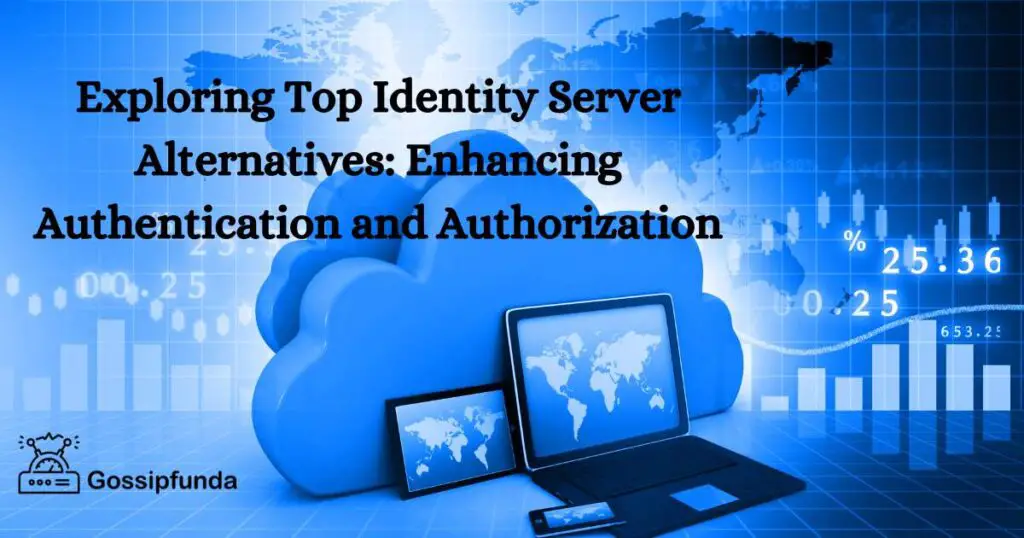In today’s digital landscape, ensuring secure and reliable authentication and authorization is crucial for organizations. Identity Server, an open-source framework for implementing security protocols, has gained popularity for its ability to handle identity management effectively. However, there are several alternatives available that offer similar functionalities with their own unique features. This article explores some of the top Identity Server alternatives, highlighting their strengths and use cases.

Also read: Troubleshooting Guide: Chrome Keeps Stopping on Android Phone
Keycloak: Open-Source Identity and Access Management
Keycloak, an open-source identity and access management (IAM) solution, is a powerful alternative to IdentityServer. It provides features such as single sign-on (SSO), social login integration, and user federation, making it suitable for various authentication and authorization scenarios. Keycloak supports a wide range of protocols, including OAuth 2.0 and OpenID Connect, ensuring compatibility with modern applications.
With its intuitive administration console, Keycloak simplifies the management of users, roles, and permissions. It also offers advanced features like user self-registration, email verification, and multi-factor authentication. Keycloak’s extensibility through plugins allows for customizations and integration with existing systems.
Auth0: Cloud-based Identity and Access Management
Auth0 is a cloud-based IAM platform that simplifies identity management for developers. It provides a comprehensive set of features, including authentication, authorization, and user management. Auth0 supports various protocols and standards like OAuth 2.0, OpenID Connect, and SAML, enabling seamless integration with applications across different platforms.
One notable advantage of Auth0 is its ease of use. Developers can quickly set up authentication with minimal code changes using Auth0’s libraries and SDKs. The platform also offers robust security features like anomaly detection, brute-force protection, and passwordless authentication. Auth0’s scalability and high availability make it suitable for applications with millions of users.
Fusion Auth: Scalable User Management and Authentication
FusionAuth is a developer-friendly alternative to IdentityServer that provides user management and authentication capabilities. It offers features like user registration, password management, and role-based access control. FusionAuth supports OAuth 2.0, OpenID Connect, and SAML, enabling seamless integration into modern applications.
What sets FusionAuth apart is its scalability and performance. It is designed to handle millions of users and can be deployed on-premises or in the cloud. FusionAuth’s flexible architecture allows for customization and extensibility through webhooks and plugins. The platform also includes features like user analytics, event tracking, and localization support.
Okta: Comprehensive Identity Management Platform
Okta is a leading cloud-based identity management platform that provides a wide range of features for authentication, authorization, and user management. With Okta, organizations can implement secure identity workflows and integrate them seamlessly into their applications. Okta supports standard protocols like OAuth 2.0, OpenID Connect, and SAML, ensuring compatibility with various systems.
One of Okta’s notable strengths is its extensive integration capabilities. It offers pre-built integrations with thousands of applications and services, simplifying the authentication and authorization process. Okta also provides features like adaptive multi-factor authentication, passwordless login, and lifecycle management, enhancing overall security and user experience.
Azure Active Directory: Microsoft’s Identity Solution
Azure Active Directory (Azure AD) is Microsoft’s cloud-based identity and access management solution. It provides a comprehensive set of features for identity management, including single sign-on, multi-factor authentication, and user provisioning. Azure AD supports popular protocols like OAuth 2.0, OpenID Connect, and SAML, ensuring compatibility with a wide range of applications.
As part of the broader Microsoft ecosystem, Azure AD offers seamless integration with other Microsoft services like Office 365, Azure services, and Windows Server. It provides a unified identity platform for organizations using Microsoft technologies. Azure AD’s scalability, reliability, and enterprise-grade security make it a preferred choice for businesses of all sizes.
AWS Cognito: Scalable User Authentication and Authorization
AWS Cognito is a cloud-based service provided by Amazon Web Services (AWS) that focuses on user authentication and authorization. It offers a range of features for user management, such as user registration, login, and password recovery. AWS Cognito supports standard protocols like OAuth 2.0, OpenID Connect, and SAML, making it compatible with various applications and platforms.
One of the key benefits of AWS Cognito is its scalability and high availability. It is designed to handle millions of users and can seamlessly scale to accommodate increased demand. Additionally, AWS Cognito integrates well with other AWS services, allowing developers to build secure and scalable applications using a comprehensive set of tools.
AWS Cognito also provides advanced security features, including multi-factor authentication, user attribute verification, and fine-grained access control. It supports social login integration, allowing users to authenticate using popular social media platforms like Facebook and Google. With AWS Cognito, developers can focus on building their applications while leveraging the robust authentication and authorization capabilities provided by the service.
Overall, AWS Cognito offers a reliable and scalable solution for user authentication and authorization, particularly for applications hosted on the AWS infrastructure. Its seamless integration with other AWS services, robust security features, and scalability make it a strong alternative to IdentityServer for organizations leveraging the AWS ecosystem.
Gluu: Open Source IAM Platform with Enterprise Capabilities
Gluu is an open-source IAM platform that provides enterprise-level identity and access management capabilities. It offers a range of features for user authentication, authorization, and federation. Gluu supports standard protocols like OAuth 2.0, OpenID Connect, SAML, and LDAP, ensuring interoperability with various systems and applications.
One of the key strengths of Gluu is its extensibility and customizability. The platform allows developers to tailor the authentication and authorization workflows to meet specific business requirements. It provides a flexible policy engine, enabling fine-grained access control and dynamic authorization decisions.
Gluu also focuses on enterprise-grade security. It supports strong encryption algorithms, secure token management, and advanced authentication methods like biometrics and hardware tokens. The platform includes features like single sign-on, user self-service, and multi-factor authentication to enhance security and user experience.
Additionally, Gluu offers integration with external identity providers and federated identity management. This allows organizations to establish trust relationships with other systems, simplifying user authentication across multiple applications and domains.
Overall, Gluu provides a robust open-source alternative to IdentityServer, particularly for organizations requiring enterprise-level IAM capabilities. Its extensibility, security features, and support for federation make it suitable for complex authentication and authorization scenarios. With Gluu, organizations have the flexibility and control to design a comprehensive identity and access management solution tailored to their specific needs.
Firebase Authentication: Seamless Authentication for Web and Mobile Apps
Firebase Authentication is a popular alternative to IdentityServer, particularly for developers building web and mobile applications. It is a cloud-based service provided by Google that simplifies user authentication and authorization. Firebase Authentication supports various authentication methods, including email/password, social logins, and phone number verification.
One of the key advantages of Firebase Authentication is its ease of integration. With just a few lines of code, developers can enable authentication in their applications, allowing users to sign up, log in, and recover their passwords effortlessly. Firebase Authentication handles all the complexities of securely storing and managing user credentials.
Firebase Authentication also offers advanced features such as multi-factor authentication, custom claims, and user management. It integrates seamlessly with other Firebase services, providing a comprehensive suite of tools for application development and user engagement.
Another notable feature of Firebase Authentication is its support for real-time authentication state changes. Developers can easily listen for authentication events and take appropriate actions in response, such as showing personalized content or redirecting users to specific pages.
Furthermore, Firebase Authentication provides built-in security features like secure token generation, brute-force protection, and account suspension. It adheres to industry best practices for user authentication and ensures data privacy and protection.
In summary, Firebase Authentication offers a straightforward and reliable solution for implementing user authentication and authorization in web and mobile applications. Its simplicity of integration, advanced features, and strong security make it a compelling alternative to IdentityServer, especially for developers looking for a hassle-free authentication solution with robust backend support.
Conclusion
While Identity Server is a popular choice for implementing identity and access management, several alternatives offer similar functionalities with their own unique features. Keycloak provides an open-source IAM solution, Auth0 offers a cloud-based platform with developer-friendly features, FusionAuth focuses on scalability and performance, Okta provides a comprehensive identity management platform, and Azure Active Directory offers Microsoft-centric identity solutions.
Each alternative has its strengths and use cases, catering to different organizational needs. It’s essential to evaluate these alternatives based on factors such as ease of integration, scalability, extensibility, and security features. By considering these alternatives, organizations can find the most suitable solution to enhance their authentication and authorization processes while maintaining the highest level of security and user experience.
FAQS
There are several alternatives such as Keycloak, Auth0, FusionAuth, Okta, Azure Active Directory, and AWS Cognito.
Consider features like authentication protocols support, user management, scalability, extensibility, and security.
Keycloak is an open-source IAM solution with intuitive administration, social login integration, and extensibility.
Auth0 is a cloud-based IAM platform known for its developer-friendly features, scalability, and high availability.
Fusion Auth focuses on scalability, performance, and flexible deployment options, making it ideal for larger user bases.
Prachi Mishra is a talented Digital Marketer and Technical Content Writer with a passion for creating impactful content and optimizing it for online platforms. With a strong background in marketing and a deep understanding of SEO and digital marketing strategies, Prachi has helped several businesses increase their online visibility and drive more traffic to their websites.
As a technical content writer, Prachi has extensive experience in creating engaging and informative content for a range of industries, including technology, finance, healthcare, and more. Her ability to simplify complex concepts and present them in a clear and concise manner has made her a valuable asset to her clients.
Prachi is a self-motivated and goal-oriented professional who is committed to delivering high-quality work that exceeds her clients’ expectations. She has a keen eye for detail and is always willing to go the extra mile to ensure that her work is accurate, informative, and engaging.



